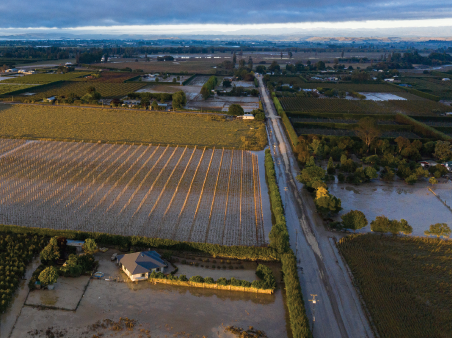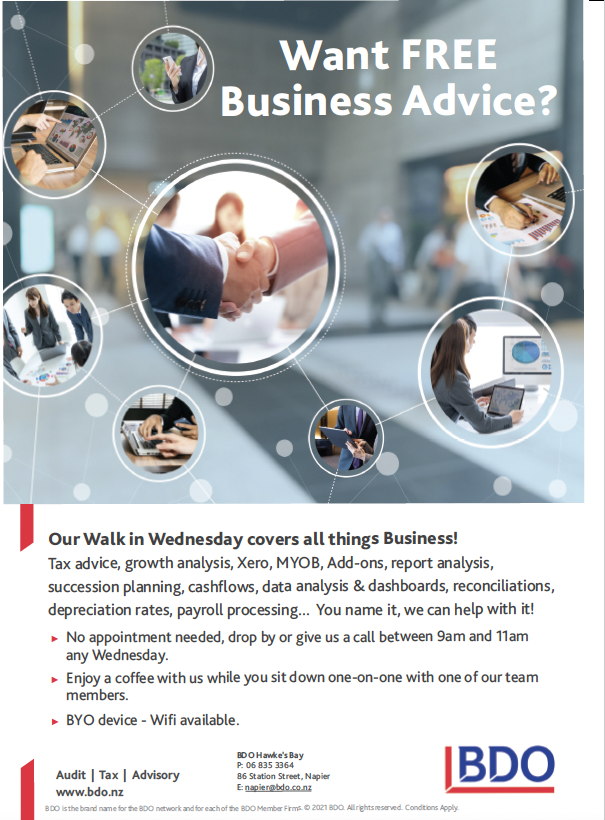The start of 2023 has been a rough one. Cyclone Gabrielle and the subsequent flooding brought a degree of destruction not seen in the Hawke’s Bay for decades.
If we have learnt anything over these last few years following a global pandemic, lockdowns and cost of living crisis, it is that as a group, Hawke’s Bay people and businesses are resilient, adaptable and incredibly hard working! And while some businesses are back to a ‘business as usual’ operating landscape, many are still in recovery mode.
Resilience goes past simply responding to disruptive events; it also means seeking out and seizing opportunities that are created by external forces. Businesses cannot control what happens in their external operating environment, the number one action you can take to manage uncertainty is to create an up-to-date risk register.
This involves identifying the top risks facing your organisation (say 5-10) and prioritising these risks before working out what controls you have in place to help mitigate them. This will give you a baseline to work from and allows you to make actionable plans to improve where and how your business is protected against risk. If you do have a risk register for your business and you haven’t reviewed this following the cyclone – now is probably a good time to review it and your action plan accordingly.
Completing a SWOT analysis is a crucial element of any risk assessment. Analysing the strengths of your business helps identify distinctive features – a strength unique to your business that competitors would have difficulty matching, or that gives you a market advantage.
Analysing the weaknesses of your business helps identify issues that may currently, or could in the future, impact on your success. You should try to identify the most promising opportunities available to you to meet your goals. Some major opportunities could be pursuing new lines of revenue, re-evaluating your premises, implementing new technology, working more online, redefining roles within the business or even acquiring new businesses. Leave no stone unturned.
Next, what are the biggest vulnerabilities in your business right now? Insufficient cash flow, a drop in demand, and poor debtor management are common culprits. It’s important to consider the people you deal with (your customers) and their businesses.
If your clients’ businesses are struggling, this will impact you. Identifying vulnerabilities empowers you to put in place a plan to overcome them. You need to be brutally honest in your assessment. A rosy plan won’t help you.
Short-term action plan
The potential output of a short-term action plan should be a succinct, “fit-for-purpose” plan that prioritises the what, who and when for your organisation and can be used as a roadmap for the upcoming months. It can also be used as a key discussion document for sharing with your business’ stakeholders. Ideally a short-term action plan should focus on a time period that lends itself to becoming the basis for a reviewed annual plan. Following a large disruptive event like the cyclone, using your risk register and updated SWOT analysis will provide the basis for a short-term plan that can be worked into your long-term action plan or provide outcomes for action at a later date when your business planning moves from a recovery to a growth phase.
Be Informed When dealing with a Regional disaster such as Cyclone Gabrielle making sure you are aware of all of the support and options available to your business is paramount. Unlike during the pandemic where we had a centralised government response with daily televised updates, this isn’t the case this time. There was an overwhelming multitude of different communication channels from a myriad of sources, all with their own unique viewpoints, priorities,
and communication styles.
If you as a business owner don’t have capacity to keep yourself informed, ensure that you delegate this task to an appropriate team member. Social media and local print publications seemed to be the communication channels of choice for many organisations, providing free, timely and easy to use platforms to distribute information. What we have heard time and time again from our local networks is that there is a degree of frustration as many affected business owners find themselves in a state of limbo.
They were waiting for instruction, waiting for guidance, waiting for information, waiting for answers, waiting for pay-outs, waiting for decisions on red zoning and some are still waiting. By completing the above tasks, business owners can take back some control during times of disruption and provide a framework for future business success even while navigating a change cycle.
Heather Hallam is a Director with BDO. She has extensive experience assisting both small and medium sized entities with a wide range of audit and advisory services, particularly in the Tax and Advisory sectors. BDO Hawke’s Bay are Chartered Accountants and Business Advisors. The firm is an independent member of BDO New Zealand and part of the global BDO network. www.bdo.nz



